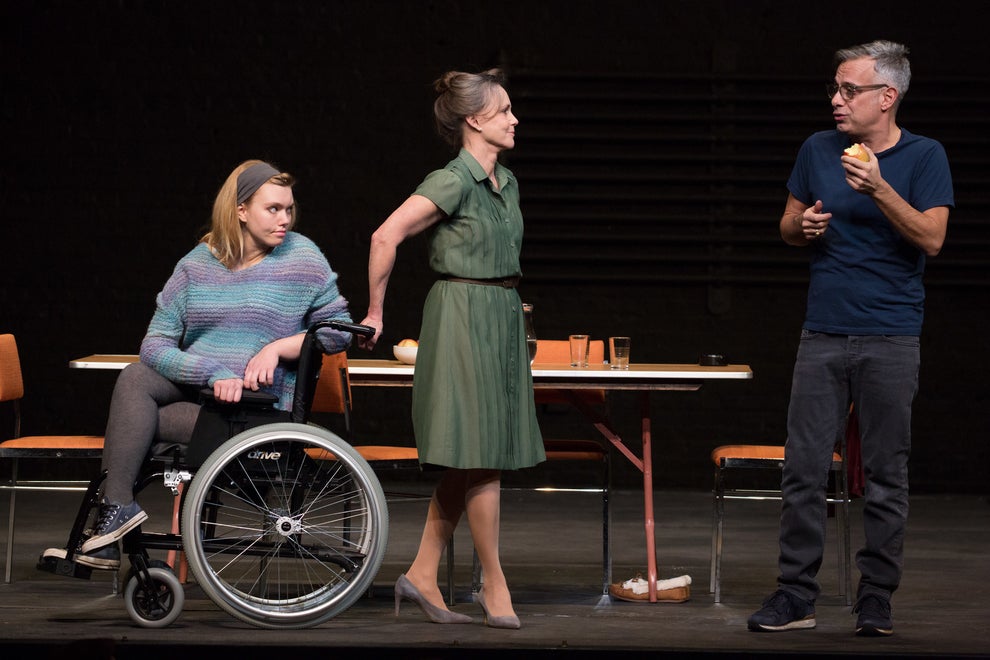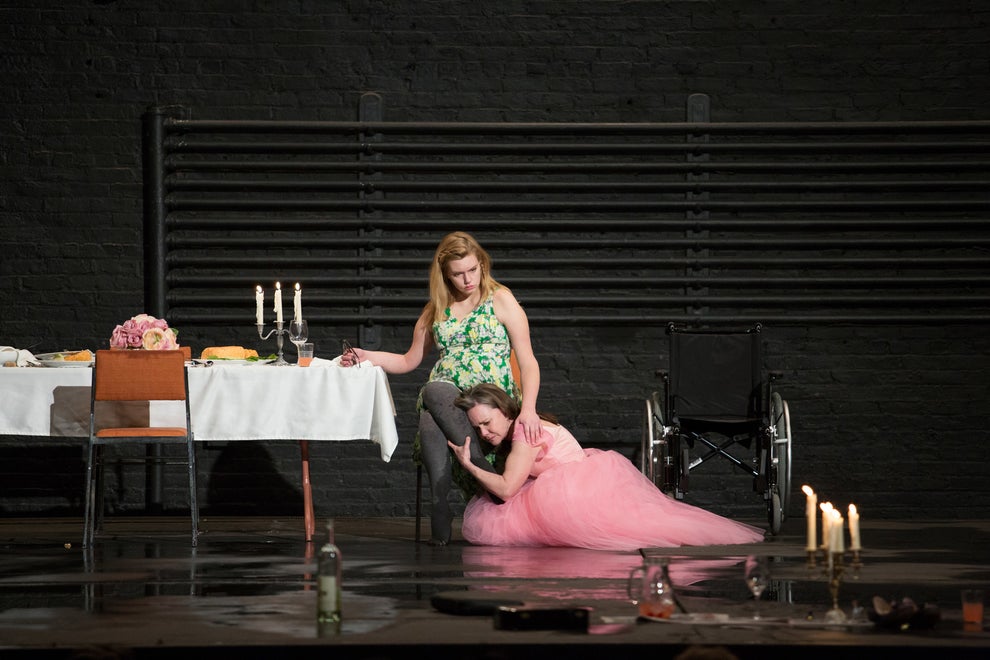
Madison Ferris as Laura in The Glass Menagerie, with Finn Wittrock as Jim O’Connor. Julieta Cervantes
“Laura is very different from other girls,” Tom tells his mother, Amanda, in The Glass Menagerie, Tennessee Williams’ largely autobiographical 1944 play. “She’s terribly shy and lives in a world of her own, and those things make her seem a little peculiar to people outside the house.”
In most productions of the play, Tom is right: Laura is meek, shaky, a wilting flower unable to stand up to her overbearing mother. A childhood illness has left her with a leg brace and a limp; in her perception, she is a “cripple.”
The role was originally played by Julie Hayden and has been taken on by Piper Laurie, Calista Flockhart, and Sarah Paulson in subsequent revivals; each woman has brought something different to the part, but, for the most part, Laura has retained a timidity that makes her as fragile as one of the glass animals she displays in her menagerie.
That’s why audiences have been struck — and Tennessee Williams purists distressed — by director Sam Gold’s new Broadway production, which stars Joe Mantello and Sally Field. Here, Laura is imbued with a surprising confidence. Madison Ferris, in her first professional role, creates a Laura whose sense of self runs counter to the way she’s described by those around her. At times, as when she plants a kiss on her gentleman caller Jim O’Connor (Finn Wittrock), she’s downright bold.
“How do you move through a world that isn’t built for you?”
The stark contrast between this Laura and past iterations was by design. In rehearsals, Gold and Ferris worked together to give Laura agency. “We discussed how to make her human, and how to make her a subject of the play rather than an object,” Ferris told BuzzFeed News, seated on the floor of her dressing room at the Belasco Theatre. “We wanted her to be strong; we wanted her to have a voice, to have opinions, to love her family, to want to hang out with Jim O’Connor.”
And so, at that moment when the script calls for Jim to kiss Laura, Gold’s production has Laura making the first move.
Williams enthusiasts may balk at the changes, but The Glass Menagerie has always been uniquely suited to loose interpretation. In the production notes for the play, Williams wrote, “Being a ‘memory play,’ The Glass Menagerie can be presented with unusual freedom of convention.” The words stay the same, but Gold — and other directors before him — have allowed themselves a certain openness with the text. Part of why the play is often revived is that no two productions are alike.
It’s not just Laura’s inner strength in Gold’s Glass Menagerie, however, that distinguishes her from past Lauras. Ferris has muscular dystrophy and uses a wheelchair; consequently, Laura’s limp, which Williams wrote “need not be more than suggested on the stage,” is presented as a visible disability. Reviews of the production have fixated on the choice to cast an actor with a mobility disability, largely because many audience members are still unaccustomed to seeing actors with disabilities onstage. What few are discussing is how disability transforms the character.
“Traditionally her fragility is her mental state, and in this production, her vulnerability is her physical state,” Ferris said, acknowledging what it would have meant to have a disability like hers in the 1930s. “How do you move through a world that isn’t built for you?”
Ferris with Sally Field as Amanda and Joe Mantello as Tom. Julieta Cervantes
Ferris is cautious when discussing her disability, not due to shame but because, as she put it, “I would hate for my disability to overshadow my acting.”
This is her introduction to New York audiences, and she wants to make the right impression. The Glass Menagerie is not only Ferris’s Broadway debut, but also her first professional role. Before this, she hadn’t acted since college, and although she had an agent, auditions were few and far between.
When she heard about the new production of The Glass Menagerie, she was in Sydney, Australia, where she had planned to spend at least six months trying to perform on a working holiday visa. Unable to travel to New York on her own dime, she put her audition on tape. “I knew that if I didn’t try, I would regret it for the rest of my life,” she said.
When Ferris got a callback, she did end up spending her own money on a flight back to the States. With the stakes so high, she admitted that she was nervous to the point of shaking, but quickly developed a rapport with Gold. The picture she’d had of Laura differed from Gold’s; throughout the audition, he wanted to see how well she took direction, and if she could play Laura in the unconventional way he envisioned the character.
Gold liked what he saw, and he continues to be impressed by Ferris’s performance in the play. “Every time she is onstage, every choice she makes, always feels like it’s her and it’s coming from an incredibly honest place,” he told BuzzFeed News. “She kind of can’t lie onstage, and that’s one of my favorite qualities in an actor.”
Because Ferris was new to The Glass Menagerie, it wasn’t hard for her to reconceive Laura. She was, however, working with a script that described Laura “like a piece of her own glass collection, too exquisitely fragile to move from the shelf.” And Gold was asking her to help create a Laura who was more steel than glass.
When learning her lines, Ferris blocked out stage directions that suggested a hesitancy and emotional restraint that her director wasn’t looking for. “It’s hard working against the text,” she acknowledged. Together with Gold, they worked on a new understanding of the character. The question was no longer “Why is Laura shy?” but rather “Why do all the other characters think Laura is shy?”
“You don’t have to be shy for people to call you shy, just because you’re not speaking,” Ferris continued. “‘Still waters run deep’ is how [her mother] Amanda describes her.”
Here, her disability also comes into play, as the way Laura’s mother, brother, and potential suitor project their expectations onto her mirrors the way Ferris is often treated in her day-to-day life. “People will think that you’re younger than you are, or your physical disability also affects your mental state,” she said. “People might assume you’re not smart or funny or a full-fledged person. And I don’t know where that comes from, maybe just a lack of representation.”
Ferris and Field in a scene near the end of The Glass Menagerie. Julieta Cervantes
Ferris thinks about representation often, but it was also a major consideration for Gold. “The Glass Menagerie is one of the few plays in the canon where there’s a character with a mobility disability, and I’d never seen it done with an actor with a mobility disability,” he said. “I thought that it would be a shame to do the play again and not give that opportunity to an actor that has a mobility disability.”
Gold’s approach is not common, as actors with disability and disability advocates are quick to point out. Casting nondisabled actors as characters with disabilities remains the norm on Broadway, as seen in productions of Richard III, The Cripple of Inishmaan, Side Show, and, yes, every previous Broadway incarnation of The Glass Menagerie.
And while there is now increased pressure to cast actors with disabilities in these parts, change is still slowgoing. There are signs of progress — the 2015 revival of Spring Awakening cast several deaf actors, as well as Ali Stroker, believed to be the first actor in a wheelchair to appear on Broadway. But even in a time of increasing awareness, disability is too often ignored in the larger conversation about diversity onstage.
“I’m tired of seeing the same bodies all the time.”
That indifference toward disability representation might account for some of the backlash this production of The Glass Menagerie has received. While the reviews have largely been positive, there have been accusations of exploitation, as well as some audience members who have confessed feeling uncomfortable at watching Ferris onstage: When she’s not using a wheelchair, she moves across the stage with her hands and her feet. In his scathing review, Rex Reed called it “alarmingly distracting.” Gold suggested that people who have a negative reaction “should be thinking about why it makes them uncomfortable to see the way Madison moves.”
More to the point, he noted, much of this criticism exposes the larger problem of ignorance about disability. “The theater community, the people who make it and the people who go see it and the people who write about it, are mostly people who think of themselves as open-minded, progressive people. They’re people who would like to be on the right side of identity politics and inclusion and diversity. And a lot of those people have a real blind spot when it comes to the disability community,” Gold said. “They’re not seeing that the way they’re perceiving the production is colored by an inability to look at that community with an open mind.”
About her role in making a statement, Ferris reiterated that she wants her acting to speak for itself so that she’s not known solely for “being an inspiration or being considered brave.” At the same time, she recognizes how few representations of disability there are onstage, and she’s willing to speak out about why she hopes to see that change.
“There are many reasons why I act, and one of them is I’m tired of seeing the same bodies all the time, in general, and I think a lot of people are, in terms of race and body shape and ability,” Ferris said. “It’s just so boring all the time to see the same people onscreen [and onstage]. And it’s just not life either.”




